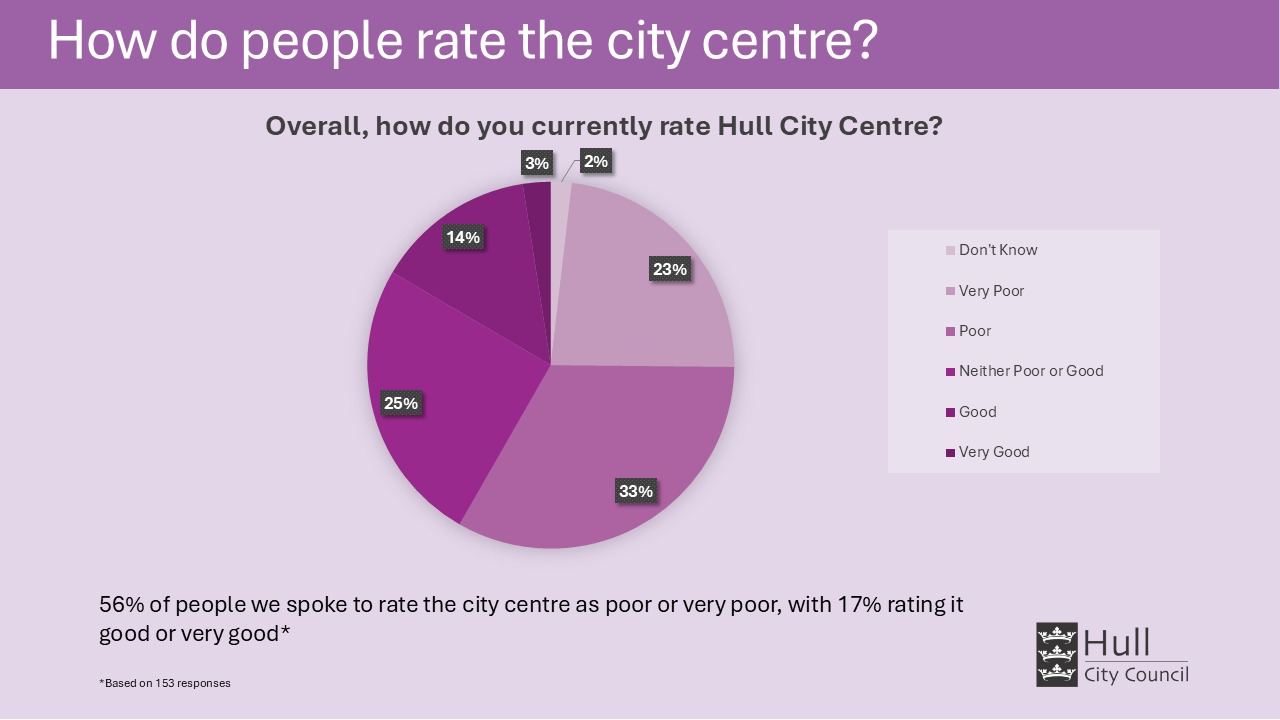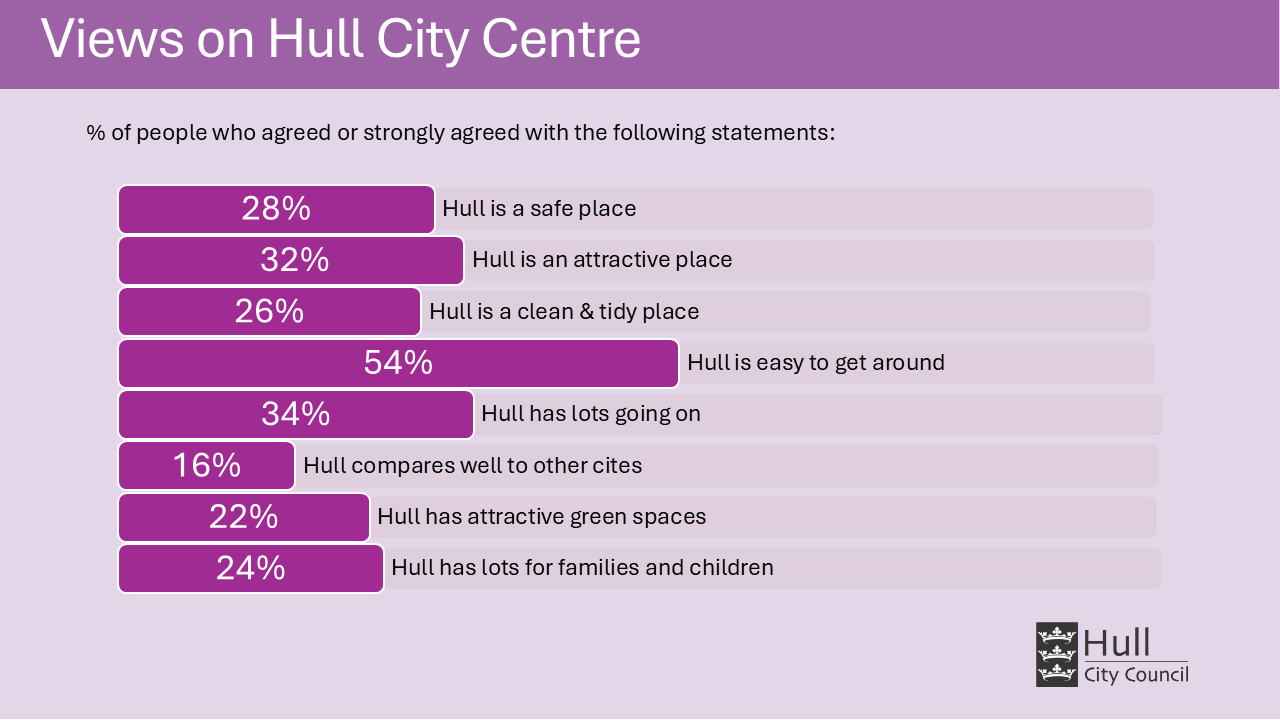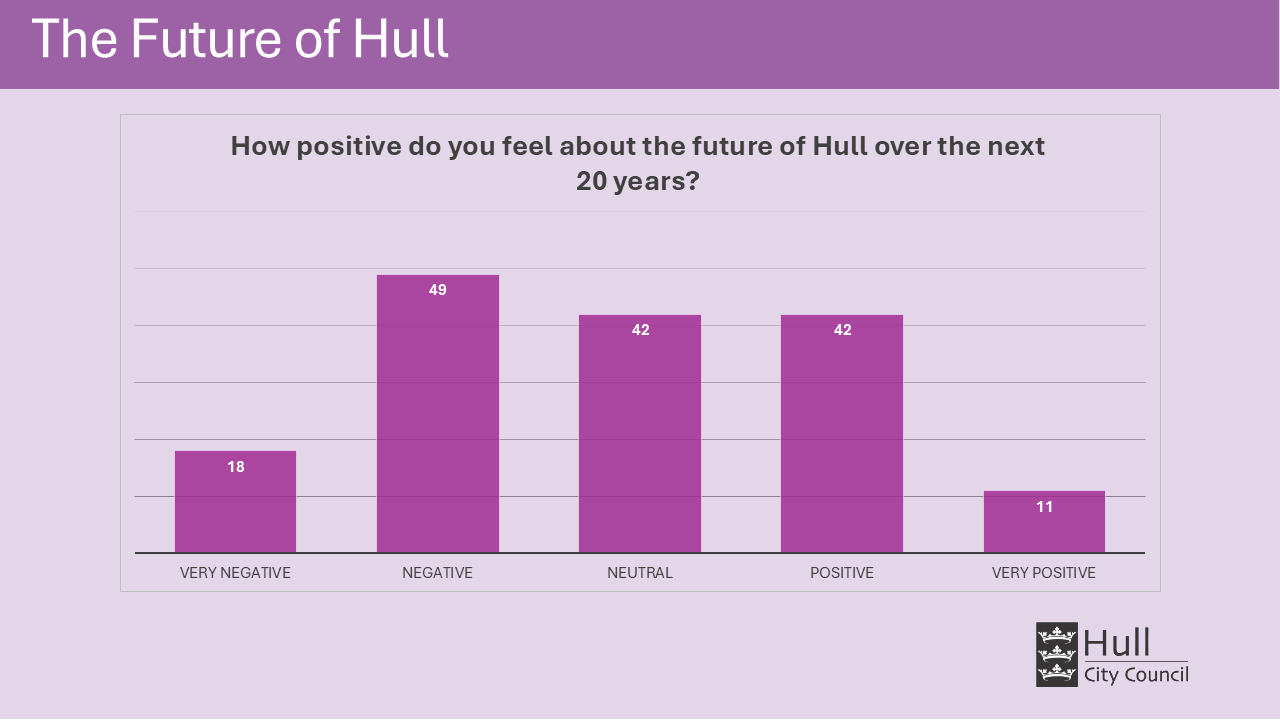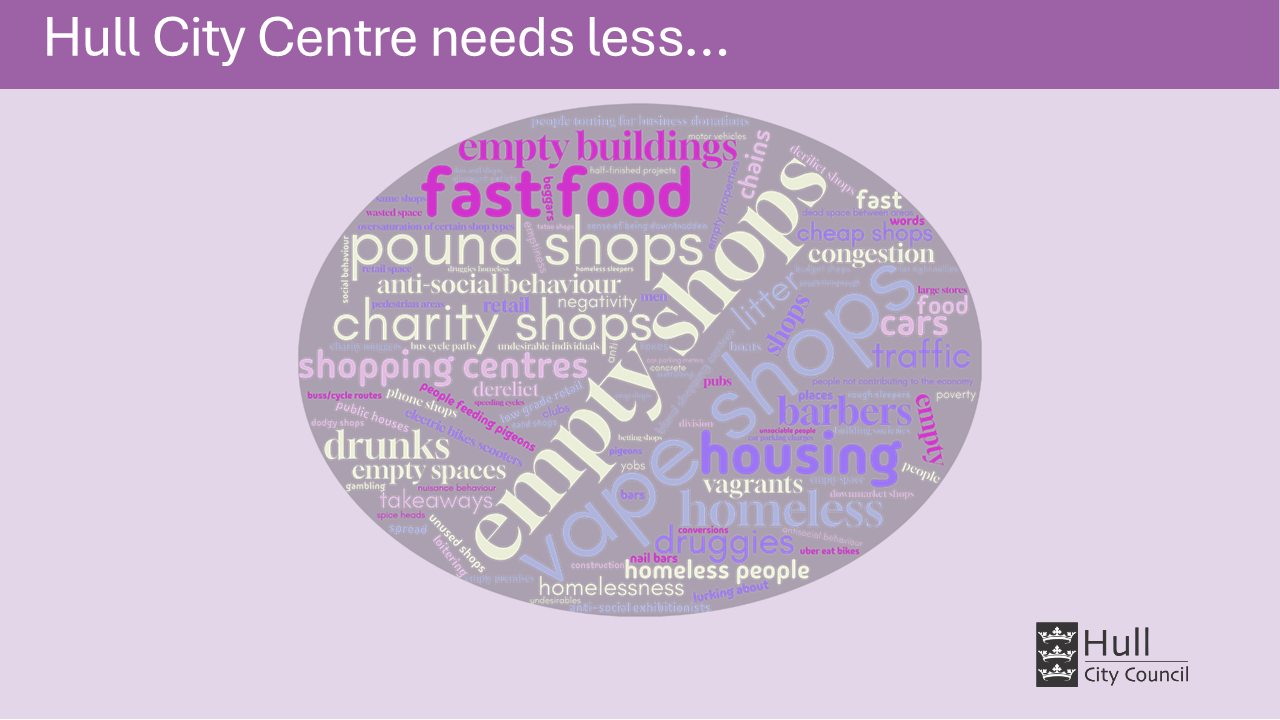WELCOME
Hull City Centre Vision will support and guide regeneration in Hullcity centre over the next 20 years.
Hull City Centre Vision sets out what a successful and vibrant city centre will look like for Hull in 2045, and the actions required to achieve this. Driven by the priorities of local communities, the City Centre Vision will provide an ambitious framework for the city to fulfil its potential over the next 20 years. Keep reading to find out how you can get involved and help shape the future of the city centre.
Hull is a city like no other in the UK. Sitting on the wide expanse of the Humber estuary, its unique mix of geography and history gives the city a special character and deep connections to Europe. Now, the city hosts a thriving port and holds an important place in the UK’s growing green economy.
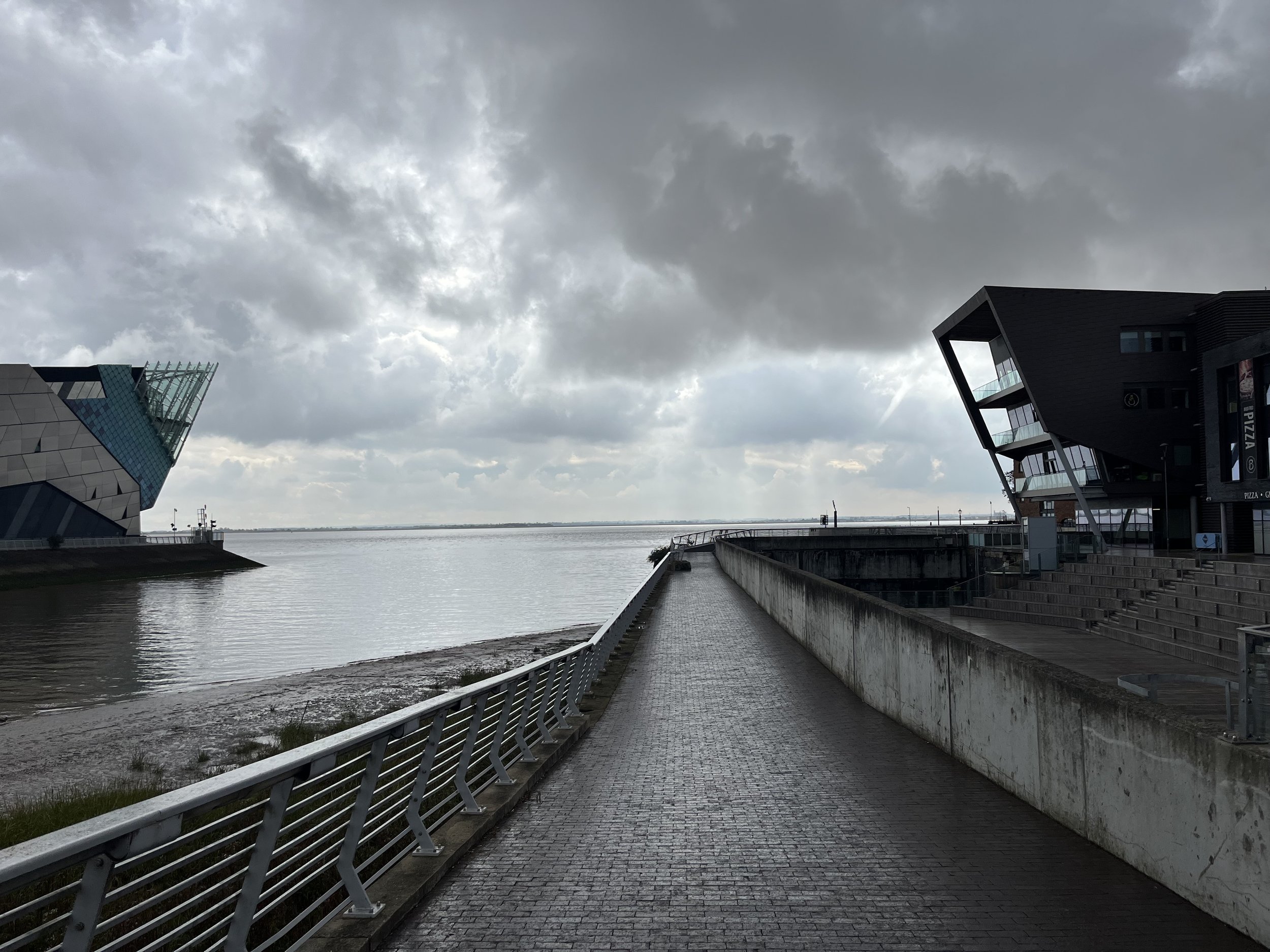
Meet the team
Hull City Council – Hull City Council commissioned the City Centre Vision using funding from the Ministry of Housing, Communities & Local Government (MHCLG)
Planit – Planit are an urban design practice who specialise in regenerating for the future through an understanding of context, people, place and potential.
Greengage – Greengage are leaders in sustainability and biodiversity. Their innovative and collaborative approach helps deliver schemes that are resilient to climate change and create places where people, business and nature can all thrive.
Yemetech - Yemetech are a dynamic technology company that harnesses the power of innovation to create positive social change. Leveraging technology as a catalyst for building stronger communities, Yemetech use data to foster connections, and drive meaningful impact in the world.
ShedKM – ShedKM are a team of socially responsive architects who have worked on regeneration project around the UK. Their work is rooted in regeneration and their approach delivers bold, engaging, economically and socially transformative schemes.
Counter Context – Counter Context are a communications, PR and public affairs agency. specialising in public engagement. They work with local government and private sector clients around the UK to build trust and understanding between local government, developers and communities.
Deloitte - Deloitte bring a wealth of expertise in both the planning and delivery of major urban regeneration schemes. Deloitte bring a wealth of expertise in both the planning and delivery of major urban regeneration schemes in towns and cities across the UK
THE VISION
Hull: Yorkshire’s Maritime City and the UK’s green energy capital
A creative place to live, work and play
Vision Drivers
Alongside organisations and communities across Hull, we have identified seven key drivers – goals for the city which will guide its regeneration. Based on the priorities of Hull’s residents, businesses and community organisations, the vision drivers describe the kind of city centre that can help Hull grow and thrive:
Innovative
A city centre, providing space for the exchange of knowledge, skills, trade, culture and energy.
By 2045, Hull city centre will support an innovation corridor along a transformed Ferensway, providing city centre space for Hull's distinctive economic offer to flourish.
Resilient
A city centre which is robust in its response to climate resilience with water management and nature enhancement a key priority in its development.
By 2045, Hull city centre will be climate resilient and biodiverse, safe, equitable, investible and highly liveable. It will be known as a leading example in water management and for its green and blue infrastructure.
Productive
A city centre which is ensuring green industry jobs support the economy and re-establish a strong workforce within the city centre, reinforcing Hull's identity as a city of makers.
By 2045, Hull city centre will be a key part of the city's future green economy adding a greater mix of uses and truly become a productive city of makers not just consumers that will be a truly sustainable place socially and environmentally.
Healthy
A city centre, where active travel is the primary means of moving to and from the city centre, through green, playful and safe streets and spaces for all people fostering a city centre that champions culture and learning.
By 2045, Hull City Centre will be place that supports healthy and happier lives for all those who live and visit it, as rejuvenated, child friendly streets and spaces will make active travel the natural choice and play an integrated part of its public realm.
Creative
A city centre, where Hull's creative talent is nurtured and celebrated, through thriving cultural and creative spaces showcasing its independent spirit.
By 2045 Hull will be known worldwide as a cultural and leisure destination, drawing people in from near and far to enjoy and participate in its unique character and independent creative spirit.
Liveable
A city centre, with more opportunities to live within active and vibrant neighbourhoods within an expanded city centre, offering greater choice and a more Liveable viable environment for development.
By 2045 Hull will be home to thriving liveable city centre neighbourhoods, strengthening its unique existing districts. The long term growth of the city will then see the city centre edges evolve in to vibrant mixed-use areas reconnecting the wider city of Hull with its centre.
Distinctive
A city centre, which continues to celebrate the city's maritime heritage, unique architectural details and emerging contemporary styles through new development.
By 2045 Hull city centre will be an even more unique and identifiable place cherishing its heritage and building on it with high quality and contextual new development. Hull will have become even more Hull truly demonstrating a 'back to ours' approach
Catalyst Projects
The following catalyst projects have been identified in partnership with HCC and its key stakeholders, to determine the strategic projects which have the potential to have a transformational effect across the whole city centre. These projects include a range of development sites, public realm projects and spatial concepts and will be expected to come forward over the lifetime of the CCV, delivered in partnership with the private sector.
Projects in the development pipeline
1. Albion Square - the site provides an iconic city centre landmark, and lies at a key corner in the city centre. Remediation work is underway, with a call out for development partners.
2. East Bank - this site has the potential to re-invigorate the expansion of the city centre, to the east of the River Hull. The 850 residential unit project provides the opportunity to animate the eastern bank of the River Hull, and celebrate the gateway into the city centre from the east. A development partner has already been identified, with work ongoing.
3. Paragon Regeneration Site - this site opens up the development potential of the city's north-western gateway, capitalising on the connection through St. Stephen's Shopping Centre and animating the routes to the Stadium and Hospital. With capacity for 2500 residential units, early stage design work is ongoing. – further detail on the emerging masterplan is available at www.paragonhull.co.uk - have your say
4. The Hull College site - the existing landmark building is no longer fit for purpose, with the wider estate under consideration to engage with Queens Gardens and open up the relationship east with the River Hull. This project has the potential to reinforce a wider education cluster surrounding it.
Longer-term Projects
5. Innovation corridor along 're-balanced' Ferensway - this project seeks to deliver a new focus for workspace in the city, clustered around Ferensway. Ferensway itself has the opportunity to enhance the arrival experience for the city and provide an enhanced, green connection down to the River Humber as the central focus of the corridor.
6. Consolidation of retail core and evolution of the historic Whitefriargate - the contraction of the retail market has left the city centre with a sporadic retail character. The opportunity to focus retail provides a chance for Whitefriargate to evolve its character, and for the city to reimagine some of the peripheral retail locations.
7. Connecting the Blue Loop - this project provides the opportunity to reconnect with the historic dock network, telling the story of Hull's Old Town, whilst also providing a continuous active travel loop through the city - linking to arts, culture, events, heritage and more.
8. 'Re-balance' Freetown Way - this project builds on the opportunity to connect the northern neighbourhoods into the city centre more effectively, following the sustainable transport hierarchy, and allowing the city centre to flourish from the creative businesses in this neighbourhood.
9. The future of Princes Quay - once the pride of the city centre, this project seeks to reimagine this unique landmark, bringing new life and activity to this space for people and nature to thrive.
10. Myton Street - this site lies along the key connection of Ferensway, and lies adjacent to the Arena and Princes Quay. This site has the potential to lead on the establishment on the Ferensway Innovation Corridor, introduce new hotel and workspace to the city centre and animate the key streets and spaces immediately surrounding it.
11. Prospect Triangle - this site provides a major barrier between connecting the Georgian New Town back to Ferensway. The historic grid pattern in this location hints at the opportunity, which has the potential to create an impressive new gateway on arrival into the city centre from Paragon Station.
Hull’s Neighbourhoods
The Vision also identifies four major “neighbourhoods” bordering Hull city centre, each with its own distinct character and uses. The five neighbourhoods addressed in the Vision are:
City Centre
Hull City Centre will grow into a vibrant, animated and distinctive hub for locals and visitors alike, with enhanced shopping, entertainment, quality housing, and business spaces — all celebrating Hull’s rich historic maritime character.
North-west Gateway
North West Gateway will announce the arrival into the City Centre, provide enhanced routes to the Stadium and Hospital and connect the neighbourhood back to the New Town, via a reimagined Ferensway and Station gateway. New residential development will animate these routes, and provide a new urban scale to the gateway into the City Centre.
Charterhouse
Charterhouse will become an established, lively and diverse neighbourhood, where people can choose to live in once, or for a lifetime. It will provide a range of new homes of different types and tenures, mixed amongst some of the existing workspaces and new light industrial and creative uses. The neighbourhood will have access to the River Hull, with new public spaces along the river and new enhanced walking and cycling routes into the City Centre. A coherent network of streets and spaces will be established providing new focuses for retail and community uses.
Western Docklands
Western Docklands will blend Hull’s maritime industry with workspace and residential development. Sitting Humberside, it contains Hull City Centre’s docks which will become new waterside destinations. Taller development will front the A63, announcing arrival into the centre of Hull from those arriving from the west.
East Bank
he East Bank neighbourhood will retain the area’s distinctive industrial character, whilst capitalising on its waterfront location and direct relationship with Hull’s Old Town to provide a mix of new residential homes and supporting community uses, alongside a new riverside park and enhanced riverside routes.
Get Involved
Our final phase of public engagement has now closed.
Thank you to everyone who provided feedback. Your comments will now be considered ahead of the final City Centre Vision being finalised later this year.
Events
Hull City Centre Vision Symposium
Thank you to everyone who attened our symposium event on 19th June. If you couldn’t make it, you can use the link below to download a copy of the presentations.
Get in Touch
info@hullvision.co.uk
FREEPOST City Centre Vision
The Story So Far
December 2024: Visioning workshops – The project team met with councillors, businesses and community groups to hear about their experiences in the city centre and aspirations for the future.
February - March 2025: First-phase public engagement – Building on in-depth data analysis from Yemetech and the feedback we received in December’s workshops, the team asked for feedback on the emerging Vision principles from people living and working in Hull. This first phase of public engagement closed on 16th March 2025. A summary of the results can be found at the bottom of this page.
April 2025: Refining Workshops – Using the feedback we received in previous stages of engagement, the team met with key groups of stakeholders, including businesses, residents’ associations, and accessibility groups, to test and refine the emerging City Centre Vision.
May-June 2025: Second-phase public engagement – After taking on board the feedback we received in February, the team are now ready to present the core elements of the City Centre Vision. We want to hear from you – does the Vision meet you expectations, and do you think there’s anything else we need to consider?
Slides not showing? Click here to view the pdf

























